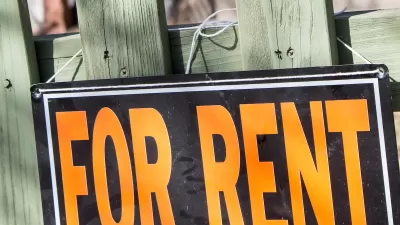The federal government forgoes around $90 billion a year in revenue for the home interest rate deduction, and the biggest beneficiaries are millionaires.

The mortgage interest rate deduction (MID) was designed, in part, to encourage Americans to buy homes and to help them afford those homes while they are living there, but many of those who receive the deduction could easily afford a home without it. In a piece for Greater Greater Washington, David Meni argues that this money could be better spent on rental assistance to people whose housing is a lot less secure.
"For someone with a $1 million mortgage, the MID means that the federal government gives you back about $22,000 a year — enough to push a family of three above the poverty line," Meni reports. This is because the deduction not the same for all home buyers, it's more for those whose mortgages are bigger. "This means that the MID actually incentives mortgage debt, rather than homeownership — you get a larger benefit if you have a more expensive mortgage," David Meni argues. Many economists argue you could remove the deduction and have zero effect on home ownership, meanwhile rental assistance programs, which get about half as much as MID forgoes, really do keep families in homes.
FULL STORY: We give some millionaires $22k/year in housing assistance. Weird, right?

Planetizen Federal Action Tracker
A weekly monitor of how Trump’s orders and actions are impacting planners and planning in America.

Maui's Vacation Rental Debate Turns Ugly
Verbal attacks, misinformation campaigns and fistfights plague a high-stakes debate to convert thousands of vacation rentals into long-term housing.

San Francisco Suspends Traffic Calming Amidst Record Deaths
Citing “a challenging fiscal landscape,” the city will cease the program on the heels of 42 traffic deaths, including 24 pedestrians.

Amtrak Rolls Out New Orleans to Alabama “Mardi Gras” Train
The new service will operate morning and evening departures between Mobile and New Orleans.

The Subversive Car-Free Guide to Trump's Great American Road Trip
Car-free ways to access Chicagoland’s best tourist attractions.

San Antonio and Austin are Fusing Into one Massive Megaregion
The region spanning the two central Texas cities is growing fast, posing challenges for local infrastructure and water supplies.
Urban Design for Planners 1: Software Tools
This six-course series explores essential urban design concepts using open source software and equips planners with the tools they need to participate fully in the urban design process.
Planning for Universal Design
Learn the tools for implementing Universal Design in planning regulations.
Heyer Gruel & Associates PA
JM Goldson LLC
Custer County Colorado
City of Camden Redevelopment Agency
City of Astoria
Transportation Research & Education Center (TREC) at Portland State University
Jefferson Parish Government
Camden Redevelopment Agency
City of Claremont





























